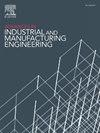Effect of uncertainty of material parameters on stress triaxiality and Lode angle in finite elasto-plasticity—A variance-based global sensitivity analysis
Abstract
This work establishes a computational framework for the quantification of the effect of uncertainty of material model parameters on extremal stress triaxiality and Lode angle values in plastically deformed devices, whereby stress triaxiality and Lode angle are accepted as key indicators for damage initiation in metal forming processes. Attention is paid to components, the material response of which can be represented as elasto-plastic with proportional hardening as a prototype model, whereby the finite element method is used as a simulation approach generally suitable for complex geometries and loading conditions. Uncertainty about material parameters is characterized resorting to probability theory. The effects of material parameter uncertainty on stress triaxiality and Lode angle are quantified by means of a variance-based global sensitivity analysis. Such sensitivity analysis is most useful for apportioning the variance of the stress triaxiality and Lode angle to the uncertainty on material properties. The practical implementation of this sensitivity analysis is carried out resorting to a Gaussian process regression, Bayesian probabilistic integration and active learning in order to decrease the associated numerical costs. An example illustrates the proposed framework, revealing that parameters governing plasticity affect stress triaxiality and Lode angle the most.

 求助内容:
求助内容: 应助结果提醒方式:
应助结果提醒方式:


